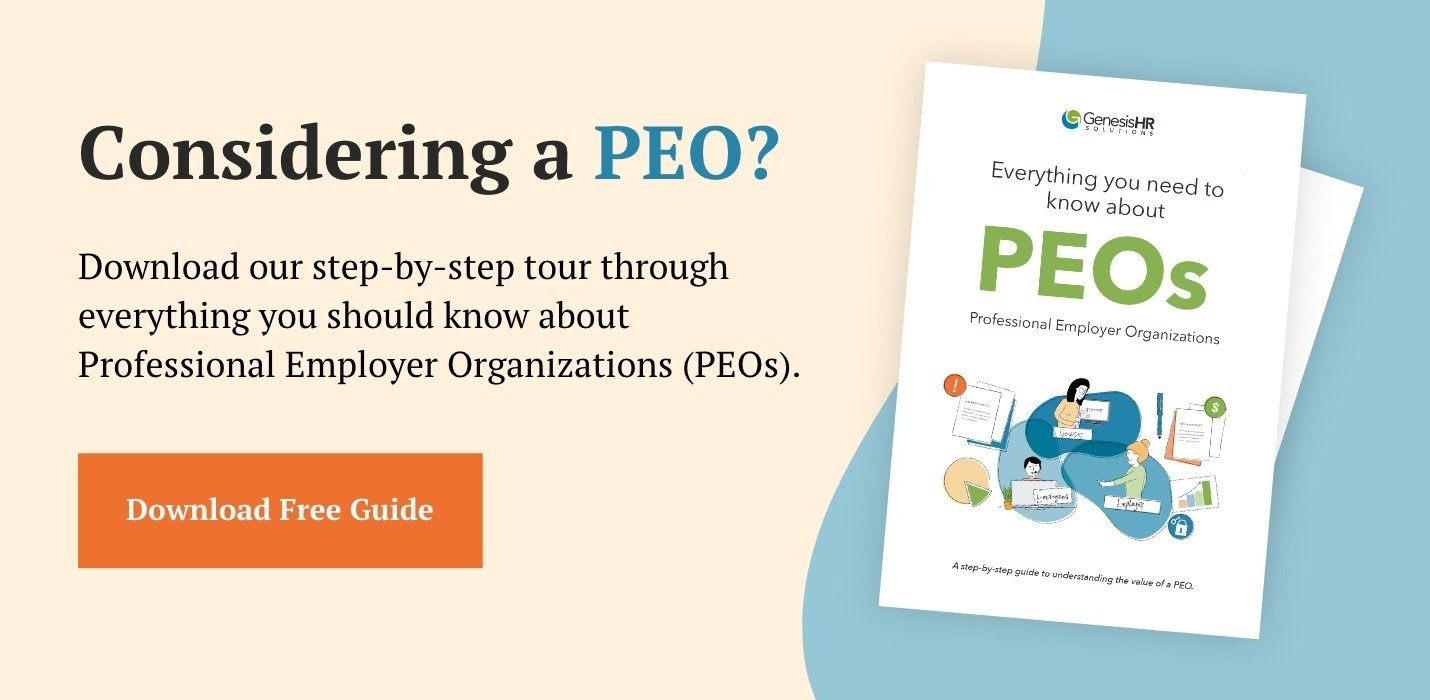If you’re struggling to navigate small business health insurance in Massachusetts—what is required, what plans are available, and where to find help—you’re in the right place. In this article, we’ll answer three questions about Massachusetts small business health insurance requirements. We’ll also discuss how partnering with Genesis HR’s Professional Employer Organization (PEO) may be the best way to ensure quality health insurance coverage for your employees.
Puzzled by small business health insurance in Massachusetts? Get answers to three important questions about health insurance requirements in this article. Share on X1. What are my requirements as an employer regarding health insurance coverage?
As a small business you are not legally required to offer health insurance to your employees. Once you have 50 or more employees the rules change. Although you may not be required to offer health insurance to your employees, your employees may actually expect to be offered insurance as a condition of employment. In today’s competitive labor market, even small employers are finding it necessary to offer benefits in order to attract top talent.
Below is a look at legislation for small business health insurance requirements in Massachusetts.
Affordable Care Act (ACA)
Under the ACA, employers must offer health insurance that is affordable and provides minimum value to 95% of their full-time employees and their children up to age 26, or be subject to penalties. This is known as the employer mandate. It applies to employers with 50 or more full-time employees, and/or full-time equivalents (FTEs). Employees who work 30 or more hours per week are considered full-time.
Massachusetts Healthcare Reform
Healthcare Reform requires Massachusetts residents over the age of 18, who can afford health insurance, to have health insurance or pay a penalty through their tax return. Although this is an individual mandate, not an employer mandate, it is easy to see how many employees would expect their employers to provide access to health insurance.
Health Insurance Responsibility Disclosure (HIRD)
Massachusetts state law requires employers with six or more employees to submit a HIRD Form annually. The HIRD Form collects employer information about insurance offered to employees. This filing is in place to help the state identify MassHealth members who may be eligible for MassHealth Premium Assistance Program.
PEOs simplify health insurance, but they do much more than that! Want to see how our PEO can help your small business run more efficiently? Check out our free guide to get the full scoop.
2. What small business health insurance plans are available for me to offer my employees?
Depending on how you manage your small business’ health insurance, you have many different options for choosing health insurance plans. Those options include:
- Partnering with a PEO to gain access to health insurance.
- Purchasing insurance from a broker.
- Purchasing insurance directly from a health insurance carrier.
- Purchasing insurance from the open market; Massachusetts Health Connector for Business
The option we recommend and think is best for employees and employers in Massachusetts is partnering with a PEO. Why? Because partnering with a PEO for your small business health insurance provides several benefits you won’t get from other options, including:
- You have access to the PEO health insurance carriers—which means you have better (and more!) options at a better price point.
- You’ll get what are arguably best-in-class products because PEOs have access to more product offerings than a small business.
- Your PEO manages the entire carrier relationship.
- You won’t have to deal with health insurance administration woes because a PEO partnership makes it easier to manage health insurance costs and administration.
- You get help from the PEO when planning for annual changes and open enrollment.
- Your employees will be more satisfied with their options.
You can read about the next step—how to actually implement health insurance with a PEO—in our article, Exploring PEO As A Way To Offer Health Insurance For Your Employees.
Note: With the other options, your small business may not have access to—or may not be able to afford—many of the more robust insurance plans offered to larger companies. You also may not get help with the management and administration of your small business health insurance plan, which can cost you time, cause frustration, and could (should errors occur) jeopardize your compliance.
3. Where can I get help understanding health insurance options and choosing which option is best for me and my employees?
First, I suggest reading through our guide to PEOs to see if a PEO can help you in ways beyond health insurance. Then, once you’re familiar with what a PEO does, if you think a partnership with a PEO might be something to look into, I encourage you to contact us. We will go step-by-step through your unique situation and compare your needs with the solutions we offer, answer your questions, and do what we can to help you improve your business.
If you have other questions about health insurance for small businesses in Massachusetts, you can also contact the U.S. Department of Labor or the Commonwealth of Massachusetts directly.




